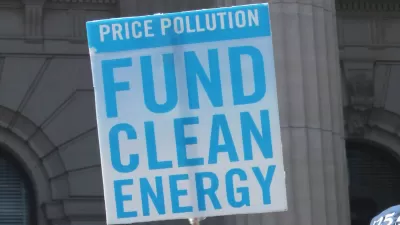In an unusual move that doesn't portend well for the EPA initiative, the Supreme Court ruled that the Clean Power Plan Rule that reduces emissions from existing power plants be suspended while it is heard by the Court of Appeals this summer.
In a 5-4 ruling, "Chief Justice John G. Roberts Jr. and Justices Antonin Scalia, Anthony M. Kennedy, Clarence Thomas and Samuel A. Alito Jr. [...] issued an unusual emergency order that blocks the Environmental Protection Agency from moving forward with its effort to reduce carbon pollution from [existing] power plants by 32% by 2030," writes Supreme Court reporter David G. Savage for the Los Angeles Times.
It is rare for the high court to intervene in a case pending in the lower courts. The brief order suggests that most of the justices have doubts about the legality of the EPA's policy.
A former Justice Department attorney [called it] a significant blow to the EPA and the administration’s climate change plan.
The Clean Power Plan rule was criticized by 29 states and state agencies who requested the stay, claiming that the plan was an overreach of the president's use of executive authority.
The order halting implementation of the Clean Power Plan rule "could also be a sign that conservative justices are increasingly skeptical of Obama’s use of executive authority," notes Savage. In a related article that deals with immigration, Savage writes that the Supreme Court will "render a verdict on his use of his executive authority."
“Make no mistake: This is a great victory for West Virginia,” said the state's attorney general, Patrick Morrisey in a press release.
“We are thrilled that the Supreme Court realized the rule’s immediate impact and froze its implementation, protecting workers and saving countless dollars as our fight against its legality continues.” West Virginia and Texas led the coalition of states challenging the EPA regulations.
The Sierra Club's press release was optimistic that the court would ultimately uphold the rule.
FULL STORY: Supreme Court deals blow to Obama by putting his climate change rules on hold

Planetizen Federal Action Tracker
A weekly monitor of how Trump’s orders and actions are impacting planners and planning in America.

Chicago’s Ghost Rails
Just beneath the surface of the modern city lie the remnants of its expansive early 20th-century streetcar system.

San Antonio and Austin are Fusing Into one Massive Megaregion
The region spanning the two central Texas cities is growing fast, posing challenges for local infrastructure and water supplies.

Since Zion's Shuttles Went Electric “The Smog is Gone”
Visitors to Zion National Park can enjoy the canyon via the nation’s first fully electric park shuttle system.

Trump Distributing DOT Safety Funds at 1/10 Rate of Biden
Funds for Safe Streets and other transportation safety and equity programs are being held up by administrative reviews and conflicts with the Trump administration’s priorities.

German Cities Subsidize Taxis for Women Amid Wave of Violence
Free or low-cost taxi rides can help women navigate cities more safely, but critics say the programs don't address the root causes of violence against women.
Urban Design for Planners 1: Software Tools
This six-course series explores essential urban design concepts using open source software and equips planners with the tools they need to participate fully in the urban design process.
Planning for Universal Design
Learn the tools for implementing Universal Design in planning regulations.
planning NEXT
Appalachian Highlands Housing Partners
Mpact (founded as Rail~Volution)
City of Camden Redevelopment Agency
City of Astoria
City of Portland
City of Laramie



























